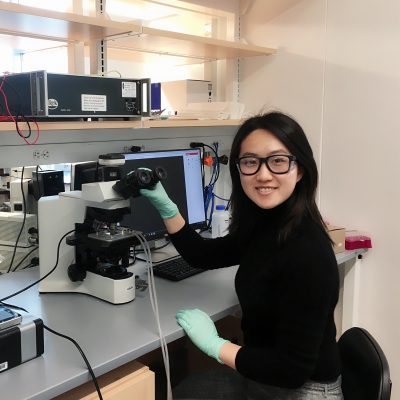Student Spotlight: Xin Wang

March 22, 2021
Xin Wang is a doctoral student in chemical engineering from Shanxi, China. After attending Zhejiang University as an undergraduate and beginning her graduate studies at the University of Wisconsin-Madison, she transferred to Cornell to continue research with her advisor and found new opportunities.
What is your area of research and why is it important?
My areas of research are colloid science and interfacial phenomena. For this American Chemical Society (ACS) conference, I focused on the self-propelled motion of multi-compartment droplets and how their structural transitions lead to multiple modes of motion. This system provides a platform for understanding dynamical behaviors of motile organisms and engineering microswimmers that display complex swimming patterns.
What are the larger implications of this research?
The physical principles demonstrated in the system described above may sound distant to our everyday lives, but in fact they underlie many processes. One of my ongoing attempts is to apply my research to collecting microplastics in water using the moving droplets. Another project I am working on is delivering polymers to targeted areas. It is also feasible to detect organic toxins in the environment by correlating their concentrations with the moving patterns of droplets.
What inspired you to choose this field of study?
I knew little about chemical engineering until the end of my freshman year of college. Then chemical engineering came into my view partially because it provides opportunities to use creativity and imagination to make a real-world impact in a variety of areas. The other part of the reason is I just like it.
Which conference did you attend with your Graduate School Conference Grant?
American Chemical Society (ACS) Fall Meeting 2020
What did you take away from the experience of attending an online conference?
Online conferences enable greater access because there is no need to travel, the cost to attend is much lower, and there is a potential to attend more pre-recorded talks. However, online conferences are limited in that they provide fewer networking opportunities and inability to ask questions for pre-recorded talks.
What are your hobbies or interests outside of your research or scholarship?
I enjoy archery and recently received my Level 2 Coach Certificate from USA Archery. I also like running, classical music, art, and trying foods that I’ve never had before. I love to learn new ideas and to understand the logic of history, society, and nature; the facts uncovered always surprise me, and the noble passion in human nature revealed always encourages me.
Why did you choose Cornell to pursue your degree?
After my first two years of study as a Ph.D. student at UW-Madison, my advisor, Professor Nick Abbott, decided to move to Cornell. Nick is a researcher with a great passion for science, considerable insights, and patience with students. Having Nick as my advisor is a great privilege of a lifetime. Cornell is a beautiful place and certainly would bring me new opportunities and challenges. Therefore, I decided to transfer to Cornell and to continue my research with Nick.
